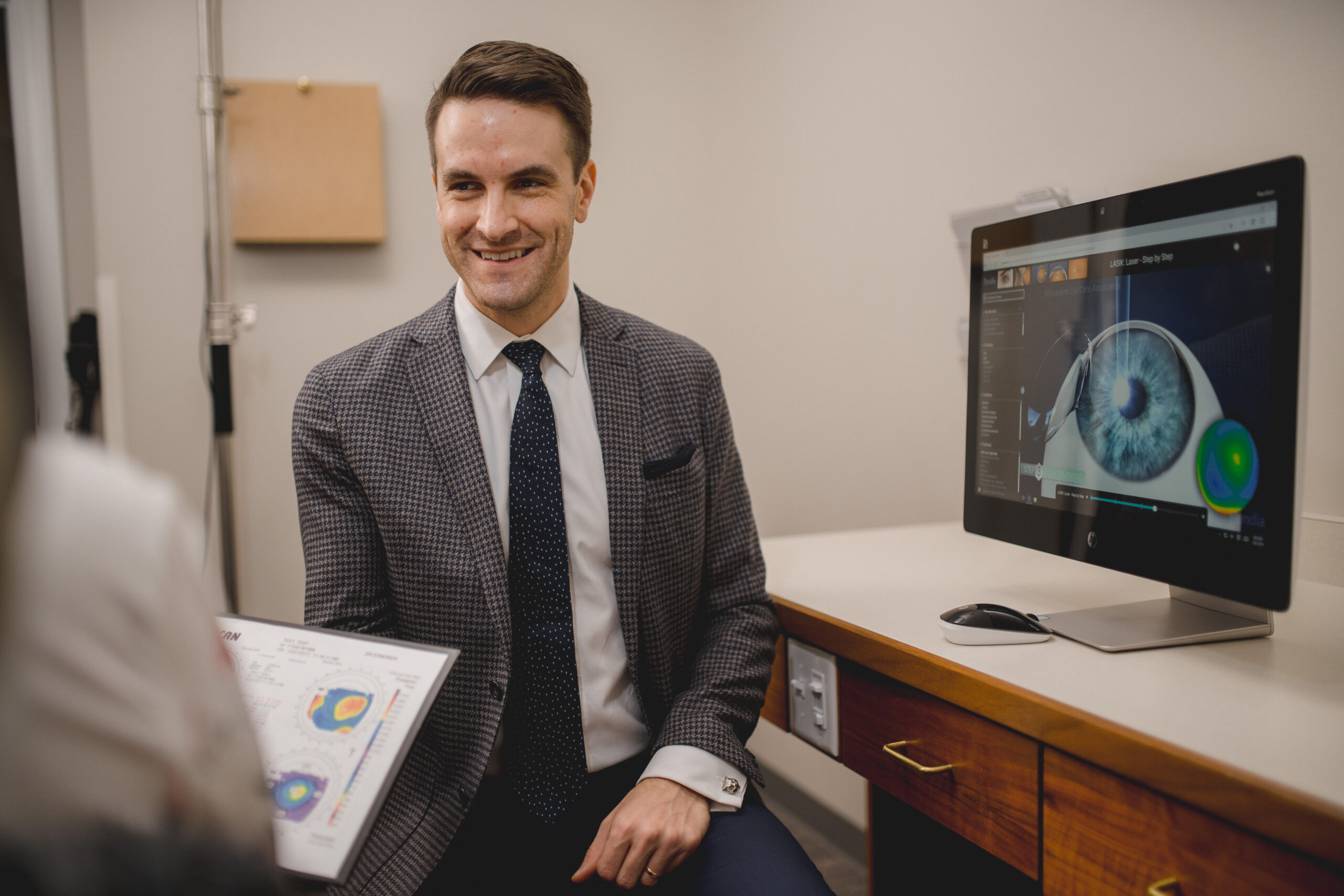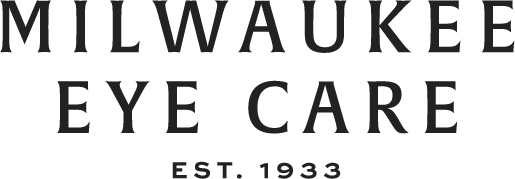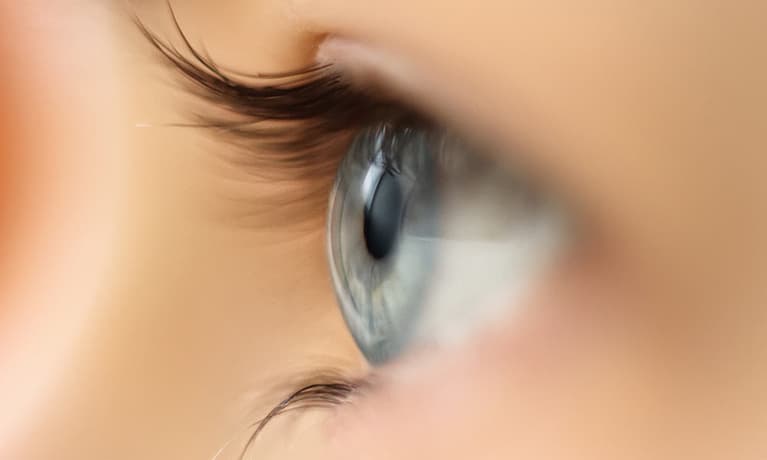Imagine waking up to a world that appears clear, vivid, and in focus. You’ve left behind the frantic search for your glasses. You no longer struggle with the daily inconvenience of contact lens care. For those looking to simplify their life and transition to freedom from glasses and contacts, LASIK vision correction offers these opportunities.
Millions of people have successfully undergone LASIK eye surgery for vision correction. Since LASIK was first introduced it continues to be one of the most popular forms of vision correction surgery with a satisfaction rate of over 98%. But what is LASIK (laser in situ keratomileusis) and how does it work? And, if you’re not suitable for LASIK, are there any other vision correction options available? As an ophthalmologist who specializes in refractive surgery, I am here to guide you on the path to clear vision and explain the difference between LASIK and PRK.
Laser Vision Correction
LASIK is one type of corneal refractive surgery performed in the United States. Other common types of corneal refractive surgery include PRK (photorefractive keratectomy) and SMILE (small incision lenticule extraction). These procedures use a laser to reshape your cornea (the clear window in the front of your eye) to treat refractive errors. Refractive errors such as nearsightedness, farsightedness, and astigmatism prevent the eye from bending light properly leading to blurry vision.
All Laser LASIK
I perform All Laser LASIK, which requires the use of a femtosecond laser to first create a corneal flap. This flap is then lifted like a trapdoor on a hinge. Next I use a second laser, called an excimer laser, to reshape the cornea precisely based on your vision correction needs. The flap is then placed back in its original position.
Following LASIK surgery patients take antibiotic and steroid eye drops to prevent infection and control inflammation. Lubricating eye drops are also used to help with discomfort while healing after surgery.
Advantages of LASIK
The advantages of LASIK vision correction include minimal postoperative discomfort and quick vision recovery. LASIK allows most patients to return to their normal activities with very little disruption to their daily routine.
Am I a Good Candidate for LASIK?
Undergoing LASIK surgery does not guarantee perfect vision. LASIK can only treat refractive errors and cannot treat vision loss caused by other eye conditions. LASIK cannot treat presbyopia. Presbyopia is a normal, age-related loss of near vision which tends to occur after age 40.
Since not everyone can have LASIK surgery, it is important to undergo a thorough medical eye evaluation with a qualified eye care provider to determine whether someone interested in LASIK is an excellent candidate for the procedure. To be a good candidate for LASIK surgery, you should be at least 18 years old or older, have a stable eye prescription for at least 1 year, have a refractive error that can be treated with LASIK, and have a healthy cornea. It is also important to have realistic expectations of what LASIK surgery can and cannot do.
with a qualified eye care provider to determine whether someone interested in LASIK is an excellent candidate for the procedure. To be a good candidate for LASIK surgery, you should be at least 18 years old or older, have a stable eye prescription for at least 1 year, have a refractive error that can be treated with LASIK, and have a healthy cornea. It is also important to have realistic expectations of what LASIK surgery can and cannot do.
You may not be a good candidate for LASIK surgery if you have cornea disease or scarring, thin corneas, an unstable prescription, extreme refractive error, certain systemic health conditions, or eye diseases that may limit your vision. Women who are pregnant or breast-feeding experience vision changes and should not undergo LASIK surgery.
Among patients that have undergone thorough preoperative screening, postoperative complications are rare and satisfaction with vision is very high. If you are not suitable candidates for LASIK there are sometimes other options for vision correction surgery.
PRK Surgery
If you don’t qualify for LASIK due to thin corneas, dry eyes, or because of corneal scarring or certain corneal conditions, you may be a candidate for PRK (photorefractive keratectomy). PRK is an alternative form of corneal refractive surgery sometimes referred to as surface ablation. PRK preceded LASIK surgery and offers similar vision results without the need to create a corneal flap.
During PRK, the outer layer of cells on the cornea are removed. This may be done with an alcohol solution, a special blade, or a brush. Then, I precisely reshape your cornea using an excimer laser. Following laser treatment, I place a bandage contact lens on the eye to assist corneal healing. Patients use antibiotic and steroid eye drops as well as lubricating eye drops during recovery.
Recovery from PRK
The recovery process after PRK differs from LASIK in several important ways. Discomfort following PRK can last for several days while the surface of the cornea heals. Occasionally prescription pain medication is required during this phase of healing. Healing of the corneal surface may take 5-7 days.
Once your corneal surface is fully healed we remove the bandage contact lens. Your vision often fluctuates within the first several weeks of recovery and it may take up to a month for the results to match those that LASIK patients see within the first days after surgery. PRK patients require closer monitoring and more frequent visits after surgery. PRK patients typically require longer treatment with steroid eye drops to prevent haze or scar formation in the cornea.
PRK eye surgery, like LASIK, cannot guarantee perfect vision. PRK can correct refractive error but cannot correct vision loss due to other eye conditions or disease. PRK does not correct presbyopia. PRK can provide excellent vision results for an appropriately screened patient.
The world of vision correction surgery can be daunting and overwhelming. It’s important to know the facts about your options before deciding which path is right for you. If you’ve been considering a vision correction treatment such as LASIK or PRK, you’ve come to the right place. At Milwaukee Eye Care, we offer the most advanced vision correction procedures. Schedule a consultation today if you’d like to find out more about LASIK or PRK, and which option fits your lifestyle best.
Schedule a Free LASIK Consultation

Written by Jason Edmonds, M.D.
Dr. Jason N. Edmonds is an experienced ophthalmologist with specialties in cataract, cornea, LASIK, and refractive surgery. He has been honored by Shepherd Express Best of Milwaukee Reader‘s Choice award for the past several years for his work in LASIK surgery and is an active and dedicated member of multiple professional organizations.










